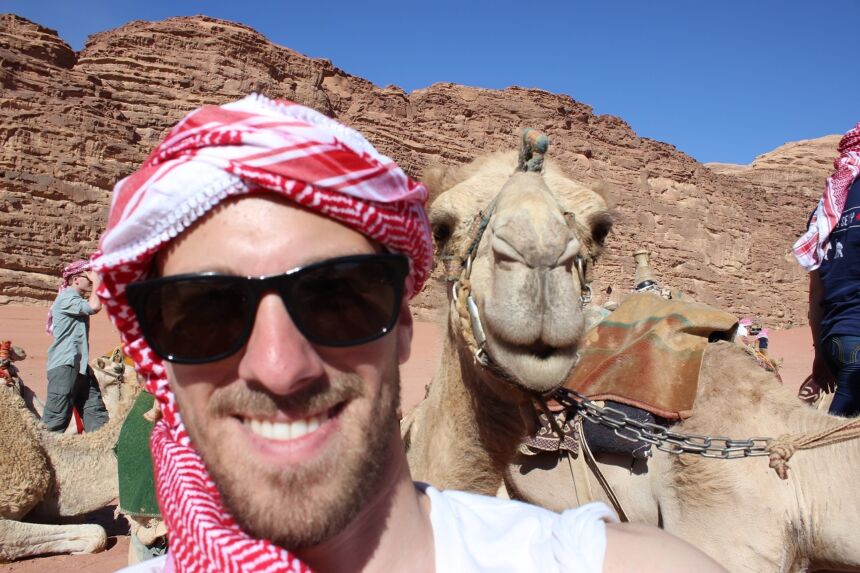July 22, 2015
SIA student embraces adventures of studying in Jordan

From riding camels through the desert, to being on Jordanian talk radio, to reliving his childhood dreams of being Indiana Jones, Joseph DiVirgilio has done it all this summer while living in Jordan learning Modern Standard Arabic (MSA). DiVirgilio, a rising second-year student at the Penn State School of International Affairs, is studying MSA in Jordan after earning a Foreign Language and Area Studies (FLAS) Fellowship from the Penn State Center for Global Studies.
He is studying in Amman, the capital of Jordan, and was able choose the location of his fellowship. He visited Jordan in 2012 as an undergrad studying archeology and never thought he would return, until he was presented with the FLAS Fellowship. While he takes classes in MSA, the dialect closest to the classical Arabic of the Quran, a different dialect is spoken regularly in the daily community.
“It’s almost like learning two different languages,” he said. “While many people understand MSA, everyone in Jordan speaks the colloquial dialect.”
In Jordan, the school week runs Sunday through Thursday. During those days, classes for DiVirgilio at the Princess Sumaya University for Technology start at 8 a.m. He spends three hours studying MSA, then takes a break for lunch before his two-hour colloquial class begins. When he doesn’t have class, DiVirgilio participates in activities planned by the program that have students visit the local markets, museums, and monuments, and explore the area.
“This makes up the bare minimum of a typical day,” he said. “Every day is different. Amman has a wealth of culture with many things to do and people to talk with, and the Jordanian people are the kindest, friendliest, most caring, and most generous people I have ever met.”
Immersing himself and experiencing the culture without hesitation was how DiVirgilio wound up on Jordanian talk radio and was given his Arabic name, Yusuf al-Amriki. During his first week in Jordan, DiVirgilio took a taxi ride and chatted with the driver. He had taken two semesters of MSA at Penn State, but was not yet fluent. The driver spoke to him in a friendly manner, and asked if DiVirgilio knew of the popular Jordanian talk radio show playing on the taxicab’s radio. DiVirgilio gave what he thought were the appropriate responses. The driver gestured toward his phone. DiVirgilio smiled and nodded politely.
“I quickly realized he wanted me to speak to the radio host, and to my surprise his call was answered!” DiVirgilio said. “The driver handed me the phone and I realized I had two options: I could refuse, which would have been rude and awkward, or I could accept, begin speaking in Arabic and see what happened. I’m so glad I chose the latter!”
The conversation was short, with DiVirgilio describing what he was studying in Jordan and what he liked most about the country. After hanging up, DiVirgilio listened to the recap of the show, where the announcer referred to him as “Yusuf al-Amriki,” or Joseph the American. When DiVirgilio related the experience to his fellow students in the program and his professors, the name stuck, and he even placed it on his papers that he turned in to his professors.
As part of his studies outside the classroom, DiVirgilio traveled through the desert by camel with the Bedouin of Wadi Rum to see the Treasury at Petra. The movie Indiana Jones and the Last Crusade uses this ancient structure as the entrance to the temple housing the Holy Grail. This is a movie series DiVirgilio reenacted as a boy, and visiting the Treasury allowed him to bring his boyhood dreams into reality.
DiVirgilio said all of his SIA classes have helped him in various ways with the experience of being in a foreign country immersed in its culture. He notes Professor Dennis Jett’s class and Professor Sophia McClennen’s mentorship have specifically helped him in Jordan. In Jett’s Colloquium on Current Policy Challenges (INTAF 590), DiVirgilio studied the issue of Jordan’s chronic water shortage and McClennen, who is the director of the Center for Global Studies, encouraged him to apply for the fellowship.
DiVirgilio applied for the fellowship because he loves languages, specifically Arabic. From the first time he heard it, traveling in the Middle East in 2010, he knew he wanted to study it. He explains that the letters are more an art than a communication medium and the language is intricately tied to Arab culture. From this summer experience, DiVirgilio has some advice for fellow students seeking enriching adventures to further their studies.
“Don’t go out looking for unique experiences. Don’t get caught up in ‘how will I sound speaking in a foreign language?’ or ‘Will I embarrass myself?’” he said. “You will absolutely do both! But shedding your apprehension in favor of total cultural and linguistic immersion is the best way to attract unique and unforgettable experiences, even if they’re just a 10-minute cab ride.”
The Center for Global Studies Foreign Language and Area Studies Fellowships assist graduate and undergraduate students in achieving competency in selected foreign languages and conducting research in related international and area studies. The FLAS Fellowships are authorized under Title VI of the Higher Education Act and are administered by the U.S. Department of Education.
The awards are intended to encourage Penn State faculty and students to engage in cross-disciplinary teaching, outreach, and research that will allow for sustained and engaged dialogue on issues of vital importance to understanding key global issues facing all regions across the world.
###
